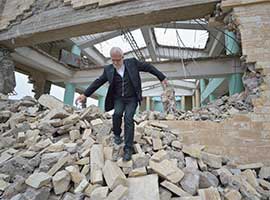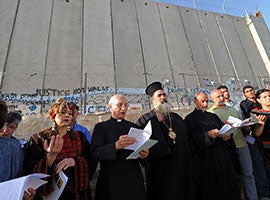Policy & Advocacy
Who are the Christians of the Middle East?
GET INVOLVED
Read the bishops' statement on how our nation can take action in the Middle East
Learn more about the Syrian refugee crisis
Pray for peace in the Middle East
Sign up to be part of our advocacy network and let our elected leaders hear the voice of the Catholic community!
Visit To Go Forth, the blog by the Department of Justice, Peace & Human Development!
According to 2010 research conducted by Pew, 65% of Christians in Iraq, Israel, Jordan, Lebanon, Syria, and Palestine are Orthodox. Orthodox Christianity shares many beliefs with Roman Catholicism and Protestantism, and has ancient and rich spiritual traditions. There are Eastern Orthodox and Oriental Orthodox Churches in the region. The Coptic Orthodox Church is the largest Christian group in the Middle East, concentrated in Egypt. The Coptic Church was founded by Saint Mark during the time of Nero, where it spread to Alexandria and took root. Greek and Syrian Orthodox Christians are also present in the Middle East.
Seven Catholic Churches or "Rites," each bearing a great and ancient history with unique liturgical traditions and culture, comprise the Catholic Church in the Middle East. Each of these Catholic Churches is in full communion with Rome, but six Eastern Rite Churches are sui iuris, or self-governing, and have their own Patriarchs. All these Churches are immersed in Arabic culture and speak the vernacular Arabic, although the Syriac Catholic liturgy is also conducted in Aramaic.
In his 2014 visit to the Holy Land, Pope Francis was "gratified by the good relations and cooperation which exist between the patriarchs of the Eastern Catholic Churches and those of the Orthodox Churches, and also between the faithful of the different Churches." He declared that the current persecution "is the ecumenism of blood, which demands a trusting abandonment to the working of the Holy Spirit."
Protestantism constitutes a small percentage of Christians in the Middle East and is a young presence in the region, mainly divided between Reformed and Evangelical churches. Protestant communities include Presbyterians, Baptists, Brethren, Open Brethren, Seventh-day Adventist, Apostolic, and many more. Protestant communities have theological and liturgical roots in the West but are often rooted in local culture; they form a bridge between the East and West.


